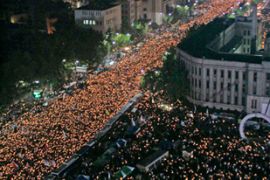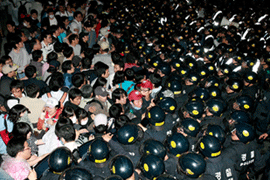Beef protesters pack Korean capital
Massive protest brings Seoul to a standstill as row over US beef imports grows.

Park Won-Suk, a spokesman for the protesters, said the demonstration had been called “to pass judgement” on the leadership of Lee Myung-Bak, the South Korean president, who he said was “ignoring people’s demands despite a month of candlelit protests”.
The row centres on the alleged health risk posed by mad cow disease – but the protests have also become a focal point for more general opposition to Lee.
On Tuesday a labour union representing 13,000 lorry drivers and transport workers announced it was calling a strike in protest at soaring oil prices.
Growing tensions
Lee has yet to accept resignations from any senior officials, but South Korean media has suggested the farm, education and health ministers may go.
As tensions grew on Tuesday, some 21,000 riot police were reported to have been out on alert on the streets of Seoul.
|
“We still don’t have a genuine democracy in our country” Jang Dae-hyun, |
Donald Kirk, a journalist reporting for Al Jazeera from Seoul, said that protesters flying banners of South Korean trade unions have denounced what they see as US arrogance for imposing the beef import agreement on South Korea.
South Korean television showed shipping containers filled with sand stacked in the streets to act as barriers, blocking access to government buildings.
Opposition groups called for hundreds of thousands of people to turn out for candlelight vigils throughout the country.
“President Lee hasn’t listened to the voices of his people. We still don’t have a genuine democracy in our country,” Jang Dae-hyun, a protest organiser, told the Associated Press.
Tuesday’s protests come on the anniversary of the landmark June 10 demonstrations in 1987 that saw the start of the democracy movement in South Korea.
Beef ban
In April, Lee agreed to lift almost all restrictions on imports of US beef, which had been banned since 2003 after a single case of mad cow disease was detected in the US.
 |
| Protesters say they cannot trust assurances that US beef is safe [EPA] |
Critics said that the decision to lift the ban was undemocratic and designed purely to clear the way for a free trade deal with the US.
Christine Ahn, of the Korea Policy Institute in San Francsico, told Al Jazeera that the issue had touched a sensitive nerve.
“They really do believe that this free trade agreement is problematic in the sense that he is trying to sell off the safety of the South Korean consumers and citizens in the interest of US corporations,” she said.
A delegation of South Korean legislators has travelled to the US to renegotiate the deal and seek an assurance that the US will not export beef from older cattle.
Both Seoul and Washington say that US beef is safe, citing the Paris-based World Organisation for Animal Health but protesters say they cannot trust Lee’s assurances.
Landslide
Lee was elected to office last year after campaigning on a pledge to revive South Korea‘s economic growth.
 |
| Lee’s popularity has taken a severe beating over the US beef import deal [Reuters] |
His victory marked the biggest landslide in South Korean electoral history.
But with protests continuing to grow, barely six months later Lee’s approval rating has plummeted to just 20 per cent.
Adding to the pressure, the embattled president warned on Tuesday that South Korea‘s economy was facing serious problems over rising inflation and slowing growth.
“We are faced with a resources crisis coming next only to the oil crisis in the 1970s and the financial crisis in the 1990s,” Lee said in a prepared speech marking the 21st anniversary of a pro-democracy protest rally.
South Korea relies almost wholly on imports of most energy, food and raw materials, making it especially vulnerable to currently skyrocketing global commodity prices.